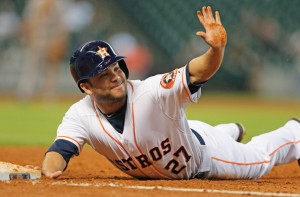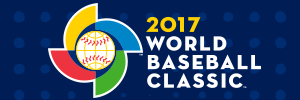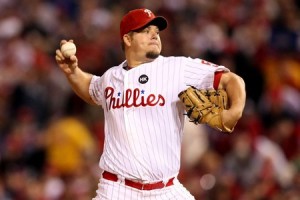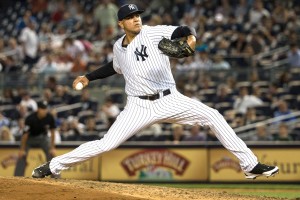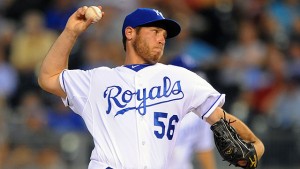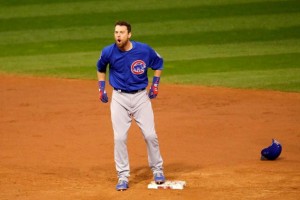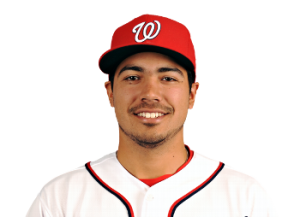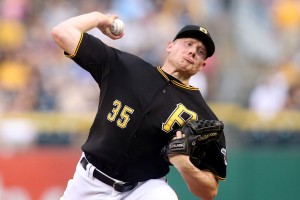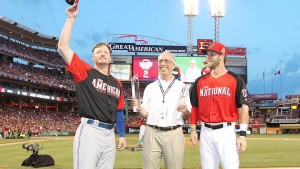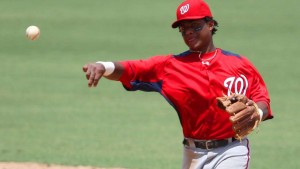
Is this the best we can do for backup infielders? photo via offtherecordsports.com
Happy New Year!
Nats Beat reporter Jamal Collier posted another inbox; here’s how I would have answered the questions he took.
Q: The Nationals and A’s have proven to be strong trade partners over the years, and I believe the A’s have a few players to fit the Nats’ needs. Do you think Washington could trade for Sean Doolittle and Stephen Vogt?
A: We mentioned this in passing in the comments discussion recently; it does make sense to try to acquire Oakland’s closer Sean Doolittle. Acquiring Stephen Vogt makes less sense right now, given that the Nats have guaranteed Jose Lobaton money for 2017 and have signed Derek Norris to be the starter. For similar reasons as to why the “Nats are still interested in Matt Weiters” arguments make no sense, acquiring Vogt wouldn’t make much sense either. If you acquire Vogt, you tell the league that you need to trade either Lobaton (no options/5-year veteran who cannot be sent down and who has a guaranteed 2017 contract) or Norris, and it isn’t exactly the best way to go about maintaining a player’s value when the whole league knows you need to make a deal. That’s why we got very little in return for Danny Espinosa, and that’s why signing a third catcher to a guaranteed deal wouldn’t make any sense.
The one issue that may be blocking a Doolittle deal is the farm system; as in, we’ve gutted it this off-season already. Billy Beane knows how valuable closers are; he just watched Aroldis Chapman and Kenley Jansen cash in and he has seen what the likes of Andrew Miller and Wade Davis fetch in trade. I’m not saying Doolittle is in that class of pitcher … but he’s not chopped liver. The price tag just may be too high for Mike Rizzo to consider.
Collier says Doolittle would be a good fit, but that Oakland isn’t shopping its players right now.
Q: Wilmer Difo is the only middle infielder on the 40-man roster, other than the starters. It seems to me the Nats need another infielder on the bench. Emmanuel Burriss seems to be the only other option. What do you think?
A: Yes, the Nats definitely need another MLB quality backup infielder. Emmanuel Burriss is not that; he’s a 4-A guy who only played last year because Philadelphia isn’t really trying right now. Wilmer Difo is not the guy you want to be injury option #1 either. This is why I want Stephen Drew back, as discussed ad naseum in the comments recently. But I also admit Drew may have priced himself out by virtue of his 2016 performance, and it may be an outlier season. Who else is out there? Not much at this point. I think the Nats are kind of thin right now all the way around; if we lose any of these key players for any length of time, the alternatives are pretty poor. Imagine giving 400 ABs right now to Difo or to Michael Taylor? I mean, what does this team do if Anthony Rendon, not exactly known for being a rock heathwise, misses 2 months? Who plays 3B for that time? Matt Skole?
I think the team needs a bit more depth both in INF and OF right now, honestly.
Collier says the Nats are comfortable with Difo as a bench option, as evidenced by his presence on the NLDS roster. But I don’t buy that; i think he was on that roster as basically a 25th man/pinch runner guy, not because he had earned it.
Q: The offseason trades seem to point to the Nats believing Stras is going to be healthy, why would they think that?
A: Because he’s not the first player to suffer a Strained Flexor Mass, because its not nearly as severe an injury as other arm injuries, and because the team is probably hyper-monitoring Stephen Strasburg‘s recovery. Its basically a 1 month injury, 2 if you’re being really cautious. Had the Nats made the World Series i bet he woudl have pitched. I can’t imagine any reason he won’t be ready to go by 4-1.
Collier notes that both he and his agent have said multiple times there’s no issues, plus Strasburg was throwing bullpen sessions in the post-season…. he’ll be fine.
Q: With the trade to the White Sox, I’m concerned that the Nats have denuded their farm system of Major League-ready top prospect pitchers. In case of injury to any of the top six Major Leaguers, it seems that there will be no “next man up” to fill in.
A: Me too! The Nats gave no less than 20 starts to pitchers outside the opening day rotation in 2016. That same number was 28 in 2015, 13 in 2014, 25 in 2013 and just 12 in 2012. So that’s an average of 19.6 “extra” starts per year thanks to injuries and unplanned absences. You’re absolutely right; the first two likely candidates to take those starts in 2017 (Lucas Giolito and Reynaldo Lopez) were both flipped for Adam Eaton. Now we’re looking at those starts going to A.J. Cole and to Austin Voth initially, and the pickings get slimmer from there. “Slim” as in, there’s only really 7 starters on the 40-man at all, so if you really get stuck you’re looking at Oliver Perez getting stretched out, or putting someone like Blake Treinen back on a starter routine. And past that? We’re talking a MLFA type like Jacob Turner or our own already-outrighted-once Taylor Hill. In reality we’d never get that far; we’d promote Erick Fedde or maybe hope that reformed knuckeballer J.D. Martin has something in the tank. But those are not really confidence-inspiring options. Here’s hoping for a healthy 2017 from the rotation!
Collier acknowledges the same and thinks the team may sign some starter depth before spring training starts.
Q: Perhaps the Nats could bring in some veteran starters to Spring Training, like they did last year with Bronson Arroyo, to compete for rotation spots and as insurance in case of an injury. What will it take to get Trout? Sure he would like to play for a winnèr.
A: See above, yes. 2016 Syracuse had some decent alternatives: Paolo Espino and Aaron Laffey both seemed to be good alternatives. Espino signed with Colorado, Laffey is still a FA. But there’s a slew of veteran FA starters out there who would probably take a non-guaranteed deal. I could see Mat Latos coming back b/c of his Dusty Baker connection. I could see an injury-case like Kris Medlen or Matt Harrison look at the SP depth and say to himself, “gee, I can probably beat out Cole and Voth for the 6th starter job!” So yeah you never know.
Trout trade; that’s just internet click bait. He’s not going anywhere. Owner won’t trade him, and putting together a package of prospects to acquire him could never work out; it’d either be not enough for the Angels, or too much for the acquiring team.
Collier tries to speculate on a package for Trout, coming up with Turner, Robles, Ross and perhaps Fedde. Think about that trade, what it would do to the current team, and what it does for the future of the team versus what you acquire, and ask yourself if its worth it.
